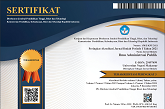Analysis of the Village Head's Leadership Style in Cidokom Gunung Sindur Village, Bogor District
(1) Universitas Pamulang
(*) Corresponding Author
DOI: https://doi.org/10.26858/jiap.v10i1.13572
Abstract
Profit is not the main goal of the cooperative business, but the business that is managed by the cooperative must obtain the remaining business results that are feasible so that the cooperative can maintain its survival and improve the ability of its business. This study aims to determine the effect of the number of members, own capital, external capital, business valves, and assets owned to the remaining results of business (Indonesian terms: Sisa Hasil Usaha/SHU) savings and loan cooperatives in Subang district. The sampling technique used was purposive sampling so as many as 14 cooperatives were selected. Data analysis used in this study is classical assumption analysis and then panel data analysis is carried out, determination of test coefficients (R2), F statistical tests, t statistical tests. Based on the results of research that has been carried out simultaneously known all independent variables significantly influence the residual business results. However, the partial test shows that only the variables of business capital, business volume, and assets owned by cooperatives have an effect on the residual results of operations, while the variable number of members and external capital has no effect on the residual results of operations.
Keywords
Full Text:
PDFReferences
Akib, H., & Darwis, M. (2015). Pengaruh Gaya Kepemimpinan Transformasional Kepala Sekolah Terhadap Kinerja Guru Pada SMK Negeri 1 Bungoro Kabupaten Pangkep. Jurnal Office, 1(1), 80–87.
Akib, H., & Salam, R. (2016). Analisis Kualitas Pelayanan Publik Berbasis Importance Performance Analysis (IPA) pada Kecamatan Kota Makassar. Jurnal Ilmiah Scientific Pinisi.
Asrar-ul-Haq, M., & Kuchinke, K. P. (2016). Impact of leadership styles on employees’ attitude towards their leader and performance: Empirical evidence from Pakistani banks. Future Business Journal, 2(1), 54–64. https://doi.org/https://doi.org/10.1016/j.fbj.2016.05.002
Gemeda, H. K., & Lee, J. (2020). Leadership styles, work engagement and outcomes among information and communications technology professionals: A cross-national study. Heliyon, 6(4), e03699. https://doi.org/https://doi.org/10.1016/j.heliyon.2020.e03699
Gevisioner, G., Bangun, R., & Karyanti, K. (2013). Strategi Pembangunan Berbasis Masyarakat di Kecamatan Perbatasan Negara di Provinsi Riau. Jurnal Bina Praja: Journal of Home Affairs Governance, 5(1), 53–62.
Handoko, T. H. (2011). Manajemen Personalia dan Sumber Daya Manusia. Pengantar Manajemen.
Hasibuan, M. S. P. (2011). Manajemen Sumber Daya Manusia. Edisi Revisi Jakarta: Bumi Aksara.
Huertas-Valdivia, I., Gallego-Burín, A. R., & Lloréns-Montes, F. J. (2019). Effects of different leadership styles on hospitality workers. Tourism Management, 71, 402–420. https://doi.org/https://doi.org/10.1016/j.tourman.2018.10.027
Ibrahim, Irfan. (2018). The Effect of New Pattern of Level IV Leadership Training and Education Policy Implementation on Leadership Competence of Supervisory Officials in Gorontalo Provincial Government. Jurnal Ilmiah Ilmu Administrasi Publik, 8(2), 165–172.
Ibrahim, Iskandar. (2019). Analysis of Management of Village Fund Allocation (ADD) in Pohuwato Regency. Jurnal Ad’ministrare, 6(1), 25–34.
Kartono, K. (2011). Pemimpin dan Kepemimpinan. Jakarta: Rajawali Grafindo Perkasa.
Nasila, J. W., & Akib, H. (2014). Participative leadership of village head based local wisdom" H4" in district. Suwawa, Bolango Bone Regency, Gorontalo province Indonesia. Global Journal of Business, Economics and Management, 4(1), 29–36.
Niswaty, R., Juniati, F., Darwis, M., Salam, R., & Arhas, S. H. (2019). The Effectiveness of Leadership Functions Implementation in The Makassar Departement of Manpower. JPBM (Jurnal Pendidikan Bisnis Dan Manajemen), 5(1), 1–10.
Pihie, Z. A. L., Sadeghi, A., & Elias, H. (2011). Analysis of Head of Departments Leadership Styles: Implication for Improving Research University Management Practices. Procedia - Social and Behavioral Sciences, 29, 1081–1090. https://doi.org/https://doi.org/10.1016/j.sbspro.2011.11.341
Sanusi, A. (2014). Teknik Pengumpulan Data dan Instrumen Penelitian. Metodologi Penelitian.
Sugiyono. (2008). Metode Penelitian Kuatintatif, Kualitatif dan R&D. In Alfabeta. https://doi.org/2008
Sugiyono. (2016). Memahami Penelitian Kualitatif. Bandung: Alfabeta.
Sugiyono, & Republik Indonesia. Metode Penelitian Kuantitatif & kualitatif. , Journal of Experimental Psychology: General § (2010).
Sunyoto, D. (2012). Manajemen Sumber Daya Manusia. Yogyakarta: CAPS (Center Of Academic Publishing Service).
Syahza, A. (2013). Strategi Pengembangan Daerah Tertinggal dalam Upaya Percepatan Pembangunan Ekonomi Pedesaan.
Thoha, M. (2014). Kepemimpinan dalam Manajemen. Jakarta: PT RajaGrafindo Persada.
Article Metrics
Abstract view : 447 times | PDF view : 54 timesRefbacks
- There are currently no refbacks.
Copyright (c) 2020 Gunartin Gunartin

This work is licensed under a Creative Commons Attribution 4.0 International License.
Diterbitkan oleh:
Program Studi Ilmu Administrasi Publik
Program Pascasarjana Universitas Negeri Makassar
JIAP Index By:

This work is licensed under a Creative Commons Attribution 4.0 International License.









